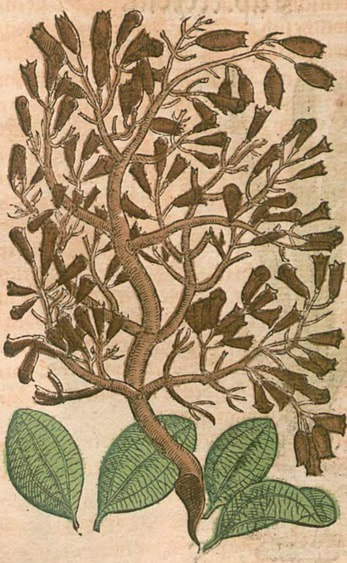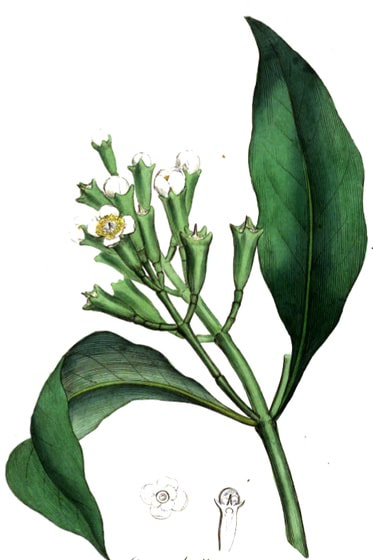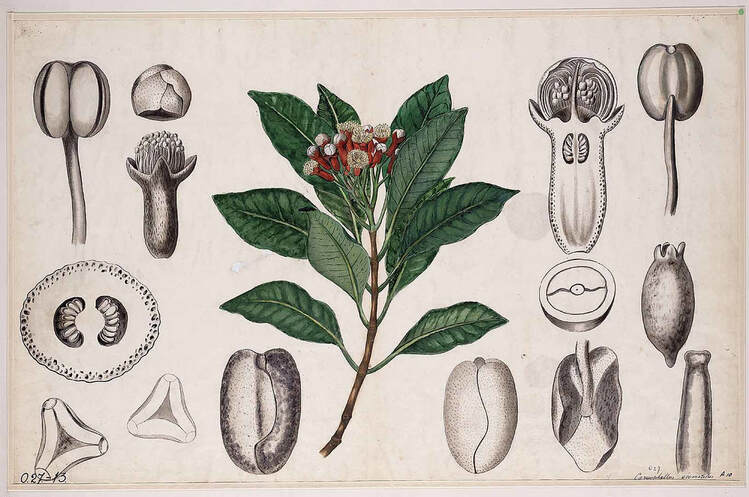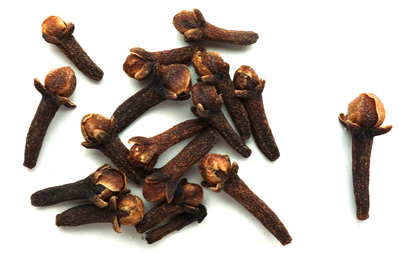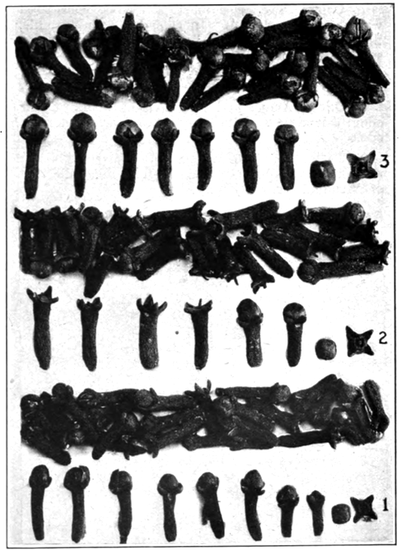|
Krauterbuch, Lonitzer, 1578
|
Medical Botany, Woodville, Hooker, Vol. 3, 1832
|
Botanische wandplaten, 1904–1914
|
Above: Clove (Adam, 2016)
|
1, Zanzibar Cloves. 2, Amboyna Cloves. 3, Penang Cloves.
Squibb's Atlas of the Official Drugs, Mansfield, 1919 |
Botanical name:
Eugenia caryophyllus (syn. Caryophyllatus aromaticus)
Parts used:
dried flower bud; 'Mother Cloves' are the dried mature Clove
Temperature & Taste:
Hot, dry. Pungent
Classification:
2A APERIENT MEDICINES. 2B ATTENUATER. 2H. CARMINATIVE. 2I. ANTISPASMODIC. 2Q. ANODYNE
3A. SUDORIFICS & DIAPHORETICS. 3C. ALEXIPHARMIC. 3D. CORDIALS & CARDIACS. 3I. APHRODISIAC.
3J. INCREASE SEMEN
4a. CEPHALIC. 4b. OPTHALMIC. 4c. CARDIAC. 4e. STOMACHIC. 4g. HEPATIC. 4h. NEPHRITIC. 4i. UTERINE.
4j. NERVINE
Eugenia caryophyllus (syn. Caryophyllatus aromaticus)
Parts used:
dried flower bud; 'Mother Cloves' are the dried mature Clove
Temperature & Taste:
Hot, dry. Pungent
Classification:
2A APERIENT MEDICINES. 2B ATTENUATER. 2H. CARMINATIVE. 2I. ANTISPASMODIC. 2Q. ANODYNE
3A. SUDORIFICS & DIAPHORETICS. 3C. ALEXIPHARMIC. 3D. CORDIALS & CARDIACS. 3I. APHRODISIAC.
3J. INCREASE SEMEN
4a. CEPHALIC. 4b. OPTHALMIC. 4c. CARDIAC. 4e. STOMACHIC. 4g. HEPATIC. 4h. NEPHRITIC. 4i. UTERINE.
4j. NERVINE
ADVERTISEMENT:
Uses:
1. Settles Wind, Regulates Qi, Opens Obstructions, Eases Pain:
-important medicine for Wind diseases: it courses and regulates the Qi, penetrating turbidity and settling disordered Qi
-excellent for the Head; good for Fainting, Headache, Migraine, Vertigo, Dizziness, Toothache
-Epilepsy, Paralysis, Trembling, Parkinsonism
-"Cloves, when taken orally or applied as a kohl (collyrium), strengthen the Eye-sight' (Avicenna)
2. Warms the Stomach, Clears Cold:
-good for the Stomach; used for 'crudities' (undigested food) of the Stomach
-Hiccup, Vomiting, Dyspepsia, Diarrhea, Nausea
-"It strengthens the Stomach and Liver and proves to be useful in Vomiting and Nausea" (Avicenna)
3. Warms the Lungs, Clears Cold Phlegm, Stops Cough:
-Cough, Bronchitis and Tuberculosis
-Throat diseases, Hoarseness, Pharyngitis
4. Warms the Kidneys, Clears Cold and Damp:
-Edema, chronic Nephritis, Urinary disorders, Arthritis
-Impotence from cold; Infertility
-used for Cold diseases of the Womb, Leukorrhea
5. Resists Poison:
-Colds, Influenza, Infectious Diseases
-Cholera, Leprosy, Gonorrhea
6. Kills Worms:
-especially Round- and Tape-worm
-also Lice and Ticks
7. Externally:
-oil is applied to Toothache, or a clove can be placed over the gum
-oil is much used in oils, liniments, plasters for Joint Pain, Arthritis, Rheumatism, Bursitis, Neuralgia and degeneration of the bones
-a few Cloves boiled in sesame oil, and three drops of the warm oil dropped into the ear is effective for Earache and Tinnitus.
-Clove dipped in water and applied to a stye gives great relief
-powdered Clove is applied to cracked Nipples
-the oil is applied to Tinea and Ringworm
Comment:
1. Occasionally, 'Mother Cloves' (Anthophyllum) is called for in classical formulas. These are Cloves that have fully ripened and can be as large as a thumb, our regular Cloves being buds. The have a fragrant gum in them and were generally regarded as stronger, but similar, to normal Cloves. The main formula that listed them was Diacameron (Diathamaron) of Nicholas.
2. Confected Cloves "warm and strengthen the Stomach, clear crudities from it, expel Wind, and strengthen Nature".
Dose:
... available in PRO version
Correctives:
... available in PRO version
Substitutes:
... available in PRO version
1. Occasionally, 'Mother Cloves' (Anthophyllum) is called for in classical formulas. These are Cloves that have fully ripened and can be as large as a thumb, our regular Cloves being buds. The have a fragrant gum in them and were generally regarded as stronger, but similar, to normal Cloves. The main formula that listed them was Diacameron (Diathamaron) of Nicholas.
2. Confected Cloves "warm and strengthen the Stomach, clear crudities from it, expel Wind, and strengthen Nature".
Dose:
... available in PRO version
Correctives:
... available in PRO version
Substitutes:
... available in PRO version
Main Combinations:
Clove & Nutmeg
Cinnamon, Clove & Nutmeg
1. Indigestion, Clove with ... available in PRO version
2. Indigestion, Diarrhea, Colic, Anorexia; Fevers (from Wind and Phlegm); Cough, Whooping Cough, Asthma, Bronchitis; and Lumbago: combine Clove with ... available in PRO version
3. Nausea and Vomiting, Clove with ... available in PRO version
4. Wind diseases, combine Clove with ... available in PRO version
5. Lung Heat, inflammation and pain of the Lungs, Cough, sore Throat, Hoarseness, Clove with ... available in PRO version
6. Cough, Asthma from excess Phlegm, Clove, ... available in PRO version
7. Bronchial Asthma, Clove with ... available in PRO version
8. Cold, weak Kidneys, Clove with ... available in PRO version
9. Impotence, Sexual dysfunction, Clove with ... available in PRO version
10. Trauma, Bruising, Lumbar strain, Tendon pain, Clove with ... available in PRO version
11. Toothache:
i. Clove with ... available in PRO version
ii. Clove oil with ... available in PRO version
12. Cold Joint pain, Sciatica:
i. Clove, ... available in PRO version
Major Formulas
Aromatic Clove Powder (Aromaticum Caryophyllatum) (Mesue)
Electuary of Clove and Costus (Caryocostinum)
Aromatic Powder (Mesue)
Diacameron Minus (Nicholas)
Powder of Clove (Ayurveda)
Six Excellent Medicines (Tibetan Medicine)
Clove 6 (Li shi drug pa) (Tibetan Medicine)
Clove 22 (Tibetan Medicine)
ADVERTISEMENT:
Cautions:
Not used in Yin deficient Heat
Main Preparations used:
Confection, Distilled Water, Distilled Oil, Extract
Not used in Yin deficient Heat
Main Preparations used:
Confection, Distilled Water, Distilled Oil, Extract
Other Parts of Clove
|
1. Clove Stalks— Festucoelvel Stipites Caryophylli, in French Griffes de Girofle, in German Selkenstiele, were an article of import into Europe during the middle ages, when they were chiefly known by their low Latin name of fusti, or the Italian bastaroni. Thus under the statutes of Pisa, A.D. 1305, duty was levied not only on cloves (garofali), but also on Folia et fusti garofalorum. Pegolotti a little later names both as being articles of trade at Constantinople. Clove Leaves are enumerated as an import into Palestine in the 12th century; they are also mentioned in a list of the drugs sold at Frankfort about the year 1450; we are not aware that they are used in modern times.
As to Clove Stalks, they are still a considerable object of trade, especially from Zanzibar, where they are called by the natives Vikunia. They taste tolerably aromatic, and yield 4 to 6.4 per cent. of volatile levogyre oil; they are used for adulterating the Ground Cloves sold by grocers. Such an admixture may be detected by the microscope, especially if the powder after treatment with potash be examined in glycerin. If clove stalks have been ground, thick-walled or stone-cells will be found in the powder; such cells do not occur in cloves. Powdered allspice is |
also an adulterant of powdered cloves; it also contains stone-cells, but in addition numerous starch-granules which are entirely wanting in cloves.
2. Mother Cloves, Anthophylli— are the fruits of the clove-tree, and are ovate-oblong berries about an inch in length and much less rich in essential oil than cloves. Though occasionally seen in the London drug sales in some quantity, they are not an article of regular import. As they contain very large starch-granules, their presence as an adulteration of ground cloves would be revealed by the microscope. 3. Royal Cloves— Under this name or Caryophyllum regium, a curious monstrosity of the clove was formerly held in the highest reputation, on account of its rarity and the strange stories told respecting it. Specimens in our possession show it to be a very small clove, distinguished by an abnormal number of sepals and large bracts at the base of the calyx-tube, the corolla and internal organs being imperfectly developed. (Pharmacographia, Fluckiger & Hanbury, 1879) |


